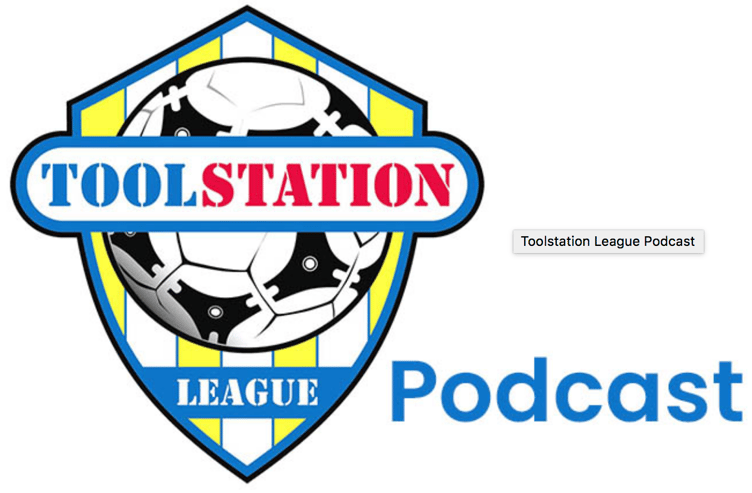Listen to the Podcast here:
IN: I am delighted to welcome back to the Toolstation Western League podcast, George McCaffery, the fixture secretary of the Toolstation Western League. George, we had some pretty bad weather this weekend, probably the worst so far of the season. Can you talk us through how that affected our fixtures?
GM: Yes, out of the intended fixtures, we actually lost eight games; five in the Premier and three in the First Division. But ten games did go ahead, three in the Premier, and seven in the First Division.
IN: So, three of those games that we lost were long distance games, weren't they? So how will those be rescheduled?
GM: Well, obviously, the plan is to create a Saturday because we don't want to have to send the clubs down either way from Bristol down to Cornwall, or Cornwall up to Bristol on a midweek. So, as you're aware, we have the blank Saturdays earlier in the season, which we left open for during the FA Cup and the FA Vase rounds. And what we were able to do was pull fixtures forward, which created blank Saturdays in January, February and March. So, now it's my job to move these fixtures into those Saturdays which don't always line up, of course, it's never that easy. So, what I do is, it's quite simple, the Mousehole and Ashton and Backwell are easy; they both have a Saturday available in February, and so that game will automatically get moved. The Falmouth-Sherborne, there was no alignment, and Falmouth only have one spare Saturday, which was the last day of the season. So, I'm having to move Sherborne's game from the last day of the season to a midweek, and then they can go down to Falmouth on the last day of the season. But again, this produces a conflict because they're actually scheduled to play the week before as well.
So, they will be playing each other on the 15th and 22nd of April. And then the Ilfracombe-Helston game was far more complex, and I had to move two games to get them on a Saturday together. So, I say to supporters and clubs and managers that you may see some of your fixtures moved, but you haven't had any postponements and you're wondering what's going on. Well, this is the reason why, because I'm trying to make it fair on all clubs, so that these long-distance journeys can be completed on a Saturday. Falmouth don't have any more spare Saturdays, so if I have any more postponements down there, the likelihood is that we will have to send somebody down to Falmouth on a midweek on a rearranged fixture. It's not something I want to do, but we've tried everything. We've done everything in our ability to make sure it doesn't happen. But that's what happens when the weather starts to bite.
IN: I mean, we've had managers on the podcast talking about the changes to the fixtures that we've had so far this season, and of course, it's going to be the sort of thing that supporters will talk about, as well. But I guess weekends like the one we've just had are the reason why it happens, because if you don't move those fixtures in the way that you did, even if at the time people don't really understand the logic behind it, it's this creation of these spare Saturdays that is the critical issue.
GM: Yes, absolutely. You look at some clubs, the likes of Keynsham, they've got six spare Saturdays next season! That's the way it works. But as I say, Falmouth don't have any, and then I've got teams like Barnstaple, who've only got one left as well, you know, so we're right on the edge.
IN: Because, obviously, you went through the sides that were impacted by the weather this weekend. But you know, the other issue, the other side of this coin, is that when you're then rescheduling those local fixtures to be able to facilitate the games that you're trying to reschedule, there's a domino effect isn't there? Ashton and Backwell against Mousehole, or Sherborne against Falmouth, it will happen, but it may involve you moving other fixtures as well to accommodate, which of course is inevitably going to impact upon other clubs.
GM: Yes, absolutely. And the prime example is Sherborne. To get Sherborne down to Falmouth I had to move their Barnstaple game, but I had to move that to midweek. So, instead of going to Falmouth midweek, they're having to travel to Barnstaple midweek, which in itself is not appetising, because for them it's 80 miles and as we know, the road is not the best. But that's what we have to do. But I can only do that in conjunction with the clubs. And I sent an email late Saturday night, early Sunday morning to all the clubs, thanking them for their positive reaction to my requests for moving and the support that they're giving me. It was forced upon us by the FA, during the restructuring, we always said it was difficult, we were very fortunate last season that we got through such a mild winter. But if we have a bad winter, really concerned that there will be some long journeys having to be undertaken by the clubs midweek.
IN: If I can just pick up on one of the points you just made there. You said that we have a solution, it was forced on us by the FA. Can you just expand upon that a bit? What is the solution?
GM: Well, the solution is that we've gone into agreement with the Peninsula League. So, we're forming a new league and that's going to be launched early in the new year, and all the information will come out. But as far as I'm concerned, what we're doing is we're creating a new, what's called in the FA parlance, Step Five League. So, another Premier Division. We will have a new league Premier Division in the North, and one in the South. So, the southern teams at Step Five will play in that Division, and we'll reduce the number slightly down to 18 to achieve that, and then our Division One, which is a Step Six Division, will align with the two Peninsula League Step Six Divisions. And we'll have some club movement there, because the borders have to be drawn depending on the numbers that we've received, and obviously we'll bring some new clubs in from the counties. We've spoken to them, and we've spoken to the clubs, everybody is on board with it but it takes an awful lot of work.
IN: If we move from the travel side of things to the sort of financial side of things, and I do appreciate that the two of those things are inextricably linked. But obviously, both clubs in a situation where a fixture is lost, inevitably both clubs will lose money because, obviously, the hosting club doesn't get the game and doesn't get the secondary spend. For those clubs that have obviously done the travelling, like the Ashton and Backwells, like the Sherbornes, they face the prospect of another expensive away day. So, is there any financial support available from the league for those clubs?
GM: Yes, when we realised that this situation could occur, the board got together had lots of planning meetings, and a fund was set up. Dave Brammer, the finance director, is controlling that, and as far as I'm aware, the club that's travelling, has the ability to contact, submit invoices and financial support will be provided, as we did last season.
IN: You've sort of answered this, George, but I want to ask it explicitly. If we look ahead, we're only in December, as we look ahead to the coming weeks, what can we do to deal with any future late postponements?
GM: It is a difficult one because, for those that don't know, the criteria from the FA is that the only person who's allowed to postpone the game is the match referee. Earlier this season, and I introduced it last season, I spoke to the clubs and said, 'look, because we used to use a local referee who would come in and whatever. And that's great, but we don't need to do that, we've got modern technology, we can use FaceTime, WhatsApp, whatever, we can use a video call.' So, the match referee himself can be talking to the home club, they can go out and kick a ball around, they can show him their concerns. So, one, it's reducing the costs; two, the referee doesn't have to go to the ground, again saving costs. And what the clubs have been told is that what you need to do - and this is why, unfortunately, it didn't work this weekend, because, as I said right at the very beginning, the clubs have been in communication with each other, and the match officials, but the pitches were playable. So, even though they'd done a video inspection, the pitch was playable, and they were happy to go with it. And it was just that that downpour came late morning. Yes, it was forecast, but how many times has it been forecast and it's never arrived? So, we can't postpone just on forecast. Somebody mentioned to me yesterday that there was a yellow warning. Well, I wasn't aware of that, and neither of the clubs had told me that. But that's something that I'll go back to the board and discuss - that if we do have an amber warning, then maybe that's where, as a league, we can take proactive stance and make that decision for the clubs, because we do have that authority on occasions of severe weather. If there's a small window of opportunity, I've got to say to that club, please travel down, and we've got to take that risk. If we had ample time and endless Saturdays available? Of course, I wouldn't. I would have called it off on Friday. But we can't. And so it's very easy to sit on the side-lines and shout and moan and groan, but actually, when you look at it in detail, it's very, very difficult trying to save a club having to travel from Cornwall, up to Bristol, on a Tuesday night.
IN: It does strike me that we're caught between the devil and the deep blue sea here, George, because on the face of it, you know, certainly from a spectator’s perspective, one of the first things you do on a Saturday morning is to check what the weather is going to be like to go to the game that you want to watch in the afternoon. But of course, I think one of the things that I've learned over the years of doing the podcast is that the more you speak to people like yourself and the managers, the players, and in particular, the chairman and the volunteers at the club, those games don't put themselves on do they? They require quite a lot of investment, sometimes financially, in order to bring in, you know, the beer and the food and all the rest, obviously it is a lot of organisation. And like you say, there is a tendency that - you know, actually we want to be playing games, don't we? I mean, that's the bottom line. Then again, you look at the weather forecasts and think, 'Oh, well, it was pouring with rain all day, was that game ever going to get played?' So, I guess a lot of the decisions that you're making are based on the quality of the information and indeed the willingness of the clubs to get these games on if they possibly can, notwithstanding what you said about the potential impact of midweek fixtures and also the impact on other clubs having to change their fixtures in order to facilitate any postponements.
GM: Yeah, absolutely. And as I said, you know, people say, 'Oh, look, it was pouring down, you should have postponed.' Well, we actually played ten games in the Toolstation League. I had a quick look, Wendron played on Saturday, and for those who don't know Wendron is very nearby Helston in Cornwall in the Peninsula League, and they actually played on Saturday. How can I go, 'Oh, it's going to rain. Let's postpone it.' It's just that thing, risk and reward, and the penalty is that I can be very flippant, postpone them early, but we're going to end up having to send clubs midweek. Unfortunately, I believe we're 55% through the season, only halfway. As I've identified we've already used up some Saturdays for a couple of clubs, so it's going to make it very difficult for me if we have future postponements to go further. And don't forget, we have Bridgwater, Buckland, and Clevedon, and they're still in the Vase. So, every time they win and move on, there's another three games that have to be rescheduled.
IN: Yeah, which is a problem that we'd like to have!
GM: Absolutely. Obviously, we wish all three clubs well, this coming Saturday.
IN: One of the interesting things there about those clubs that you mentioned, of course, is Buckland. And whilst we were lucky that last season, we did have a mild winter, and we shouldn't forget about all the football that we lost due to COVID the seasons before that. Before that there was the Buckland doomsday scenario, wasn't there? I can't remember, can you remind me how many games they had to play?
GM: Ten games in 12 days, including the Les Phillips Cup Final, bless them!
IN: Because that's the inevitable consequence, isn't it, of games being postponed over the months of January and February. Whatever latitude you may have to reschedule fixtures, you will have a drop-dead date from the FA and I think in the post-COVID world, there is no appetite whatsoever to be pushing that drop-dead date back.
GM: No and the big thing is, of course, that we've got to finish on the 22nd of April, because on the 29th of April, our runners up are likely to be in a playoff game against the Southern League side. So, we have to have that in place. That wasn't so with Buckland, but the FA still forced us there. They gave us an extra week then, but they can't now. There is no movement at all. Our league has to finish on the 22nd of April.
IN: Just one final question before I let you go, because I do appreciate you taking the time to speak to us. How long have you been the fixtures secretary for?
GM: I've forgotten. Probably six years, I think, something like that. I came in, it was ... I think the Buckland situation was my second year, and then we went in, as you say, into COVID. And then we went into the non-league restructure. So, I haven't really had a comfortable season since taking the role.
IN: Because certainly at a Step Five level, our League has grown and grown and grown in terms of the travel distances.
GM: Yes. It really is, and it's unfair on the clubs. Yes, we can say the Cornish clubs knew what they were coming into, but they've still got to finance that. They're travelling over 5,000 miles a year. The average our clubs are travelling is just over 3,000, but that's almost double what it was when I started. So, it is a great financial constraint, especially with the increase in cost of travel now, as well. You're throwing that on top of our situation. So yeah, I feel for the clubs, and I can do, as hopefully the club secretaries will tell you, I will liaise and arrange as much as I can around their individual needs.
IN: George, thank you very much for your time.
GM: No worries. Thank you and wish everybody well this weekend. Thank you very much.





Comments
This article has no comments yet. Be the first to leave a comment.